Celebrating our volunteers on International Volunteer Day
Today is #InternationalVolunteerDay and it’s our chance to celebrate and say thank you to the hundreds of people who volunteer for us in a number of ways and help us look after London every single day.
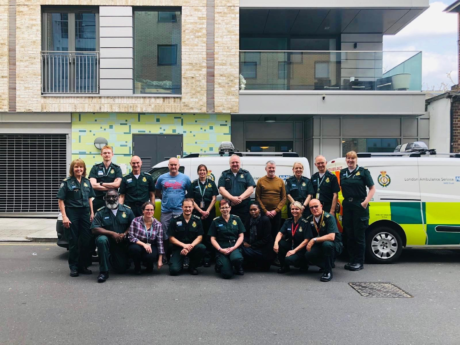 As the saying goes, “There’s nothing stronger than the heart of a volunteer”, and we are delighted to be supported by hundreds of people from all walks of life who make a vital and fantastic contribution to our staff and our patients.
As the saying goes, “There’s nothing stronger than the heart of a volunteer”, and we are delighted to be supported by hundreds of people from all walks of life who make a vital and fantastic contribution to our staff and our patients.
We run volunteer responder schemes, where members of the public with clinical skills or emergency life-support training, respond alongside our staff to life-threatening 999 calls. We also work closely with St John Ambulance as well as support a number of staff volunteers who deliver talks to community groups and schools.
Volunteering with us
People volunteer in a number of different ways for us, each donating their time, skills and energy to supporting us saving lives and treating patients. Here are just some of our volunteering schemes.
Emergency Responders
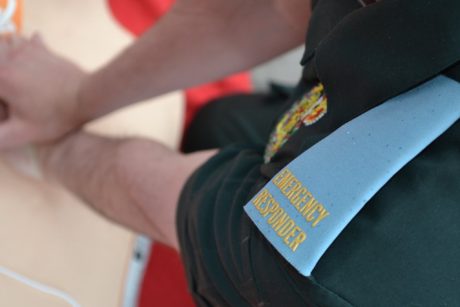 Our 150 Emergency Responders are clinically trained volunteers who respond to some of our most serious 999 calls on blue lights, alongside our front line ambulance crews.
Our 150 Emergency Responders are clinically trained volunteers who respond to some of our most serious 999 calls on blue lights, alongside our front line ambulance crews.
After passing the application and assessment process, ERs complete a six day training where they learn life- saving skills so they are equipped to respond to our critical patients. They are required to maintain ongoing continuing professional development (CPD) as we ask them to complete a minimum of 16 hours of operational shifts per month.
Following the training, ERs are given a green, LAS uniform and are able to book onto one of our eight ER vehicles for shifts that suit their lifestyle and other work commitments. ERs provide a vital service to our emergency response to London, and just last year (2018-19) gave a total of 24,495 hours treating almost 10,000 patients!
The ER programme is entirely charity funded. You can find out more and donate to our Voluntary Responder Group here.
Community First Responders
Our CFRs are defibrillator-trained St John Ambulance volunteers who help us respond to 999 calls.
Unlike ERs, CFRs respond to calls in their own cars and not on blue lights, but very much like our ERs they provide a vital service to us and London, especially in treating people in cardiac arrest
Last year alone, our 150 CFRs gave a total of 13,054 volunteer hours in and treated 5,778 patients!
Community Education Volunteers
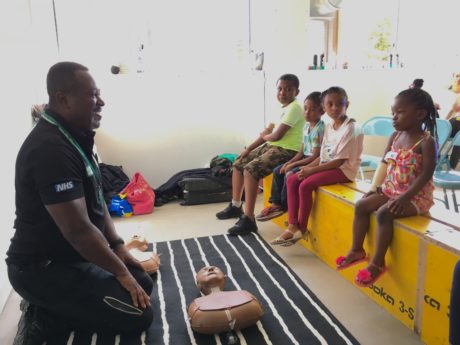 Our staff volunteer for us too! We have a very popular public and community education programme, which is supported by our staff who give up their time to deliver education talks to community and school groups and attend events across London.
Our staff volunteer for us too! We have a very popular public and community education programme, which is supported by our staff who give up their time to deliver education talks to community and school groups and attend events across London.
They talk to the public about everything from CPR to knife crime – and always get a big applause!
Around 1,468 members of Team LAS are signed up to support our education programme, and last year some of them delivered an incredible 1,077 hours of volunteering, speaking to 172,649 Londoners! To make this programme even bigger and better and to the numbers of staff volunteers we have, we’ve just introduced a Community Education Volunteers training scheme. Following the training, our staff will be able to deliver talks on knife crime, road safety, CPR and more.
Become a volunteer
Everyone can be a volunteer when it comes to saving lives – if you learn some basic life-saving skills and learn how to use a defibrillator, you have the potential to make a very real contribution in your community. Here’s how:
Good Sam app
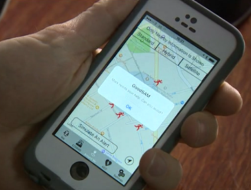 If you have the Good Sam app and are trained to LAS standards in basic life-support skills, you can sign up as a volunteer to respond to life-threatening emergency incidents, including cardiac arrests, near to where you are. When we receive a 999 call and it’s classified as life-threatening, and you’re nearby, you’ll be sent an alert. If you’re available, you can make your way to the incident and – potentially – be first on scene and possibly save a life! If you’re not able to accept an alert, it will be diverted through to the next nearest responder.
If you have the Good Sam app and are trained to LAS standards in basic life-support skills, you can sign up as a volunteer to respond to life-threatening emergency incidents, including cardiac arrests, near to where you are. When we receive a 999 call and it’s classified as life-threatening, and you’re nearby, you’ll be sent an alert. If you’re available, you can make your way to the incident and – potentially – be first on scene and possibly save a life! If you’re not able to accept an alert, it will be diverted through to the next nearest responder.
Find out more about Good Sam here.
First aid
With basic first aid skills, you could be a real life saver! Learning CPR and other skills means you could be there for someone if they’re in cardiac arrest, having a heart attack or choking, for example.
We provide free, hour-long Heartstart training – coordinated by the British Heart Foundation – at our HQ in Waterloo to voluntary/community groups and charities. We also run training courses to support
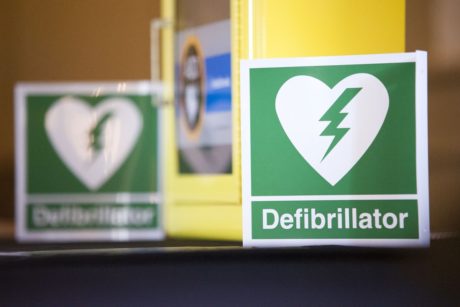
businesses and organisations in the public and private sector learn life saving skills.
Using a defibrillator
Learning how to use a defibrillator and knowing where the nearest one is to the places you spend most of your time, has the possibility to save someone’s life if they go into cardiac arrest. The sooner CPR is delivered, the better the chances the person has of survival. There are around 5,000 locations in London with at least one defibrillator, including train and tube stations, musems and gyms.
Meet some of our volunteers
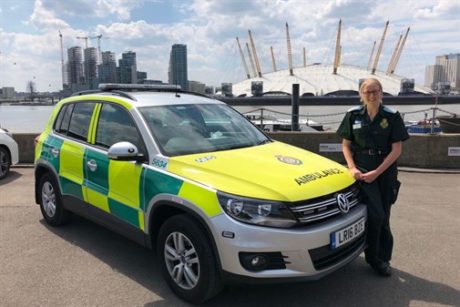 Stephanie is a registered nurse working in emergency medicine, and she signed up to be a ER to make a difference.
Stephanie is a registered nurse working in emergency medicine, and she signed up to be a ER to make a difference.
“I have always been interested in pre-hospital care, so I saw the scheme as an opportunity to further my knowledge and understanding of pre-hospital care. Also, having worked in A&E for three years and speaking to ambulance crews, I am very aware the pressures the ambulance service face so I wanted to help wherever I could.”
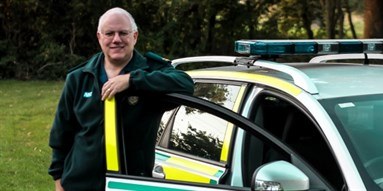 Ian owns his own software company, and started his ER journey so he could give something back to the community.
Ian owns his own software company, and started his ER journey so he could give something back to the community.
“My most memorable moment of being an ER was being first on scene to a cardiac arrest (that wasn’t given as a cardiac arrest) where a woman had choked on her food and ultimately arrested. The teamwork with my ER crewmate, and subsequently with the crew that arrived, culminated in a successful resuscitation. Like all my ER colleagues, I find working as an ER is extremely rewarding and is an opportunity to “give something back” and I have met some amazing people.”
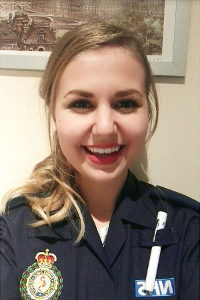 Dayana is a Neuroscientist and a Special Constable with the British Transport Police.
Dayana is a Neuroscientist and a Special Constable with the British Transport Police.
“I have always had an affinity for clinical work. I wanted to help people and make a difference to someone’s life, whilst thinking on my feet. I saw being an ER as the perfect way to gain clinical skills, support crews and other emergency services, and do my part in giving back to the community. If you have the time to commit to the scheme and you are up for a morally rewarding challenge, go for it!”

Follow us on social media: